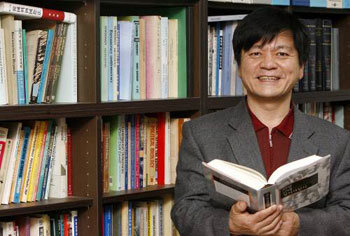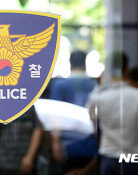Live with Ideologies but Do Not Marry Them
Live with Ideologies but Do Not Marry Them
Posted December. 25, 2007 07:00,

Do live with ideologies but do not marry them, said Politics Professor Kang Jeong-in (53) at Sogang University, who published his name in two recently released readers on the history of western political thinking, which warn of the social tendency to be absorbed excessively in the politics of South Korea.
Professor Kang took charge of planning and editing A History of Modern Western Political Thoughts (published by Book World), the first introductory book of the history of west political thoughts to be compiled by a South Korean professor. He also led the joint translation of Politics and Vision (published by Humanitas), the masterpiece of Sheldon S. Wolin (85) known as a expert in the U.S. political philosophy circle along with Leo Strauss and Hannah Arendt.
A History of Political Theory by Sabine and Thorson (published by Hangilsa) and The History of Political Philosophy by Strauss and Cropsey (published by Ingansarang) are the most established introductory books of the history of western political thoughts marketed in South Korea. The former was first published in the 1930s and revised in the 1950s, and the latter contains thesis articles written in the 1920s and 30s. However, they are both translated books.
A History of Modern Western Political Thoughts was planned out of the recognition that no book has been published independently digesting western thoughts despite the fact that 130 years have passed since western modernization began in South Korea. Twelve South Korean scholars compiled and reorganized the articles published in Quarterly Sasang between 1999 and 2003 on 19 political thinkers ranging from Machiavelli to Niche. Professor Kang led the course of reorganization with professors Kim Yong-min (Hankook University of Foreign Studies) and Hwang Tae-yeon (Dongguk University), and wrote three chapters on Machiavelli and other thinkers.
Professor Kang, who studied under Hannah Pitkin, a pupil of Wolin, at Berkeley University, is translating Politics and Vision with his disciples. The book was first published in 1960 containing 10 chapters and was supplemented and revised in 2004 to contain 17 chapters. Kangs books, recently published, cover individuals ranging from Plato to Calvin. One will span Machiavelli to modern politics, and the other from post-modern to contemporary political thoughts.
Id like to point to Machiavelli more than anyone else as the western political thinker that South Korea needs to pay attention to. He presented not only the political ideal (republicanism) but also the method (absolute monarchy) for resolving transitional problems that arise in reaching the ideal.
Regarding Machiavelli, Strauss, Arendt and Wolin, who are called the godfathers of Neocon, show dissenting opinions. Strauss found it ideal to revive ancient politics, but criticized Machiavelli as a fallen angel for choosing realism and pragmatism rather than truth and justice. Arendt and Wolin appraised Machiavelli as the liberator of politics from religion and ethics. This difference also enables us to estimate the ideological difference between the George W. Bush administration that gained support from Neocons and South Koreas next government that chose pragmatism.
Professor Kang compared the political thoughts to computer operation systems. If John Locke is the version 1.0 of western liberal democracy, John Stuart Mill is 2.0, and John Rawls would say that they are all imported software not produced domestically.
South Korea might be able to produce 3.1 or 3.2, but not 4.0. The reality South Korea faces is that people prolong kill-or-cure fights without having an exact understating of western political thoughts. [Producing a version 4.0 system] is only possible when we as South Koreans develop a mechanism of practical thought about the political reality unique to South Korea and develop it into a value universal to the human race.
He suggests taking the Jewish issue as the model for structuring independent political thoughts. Just like visions such as the spiritual liberation of Jesus, the social economical liberation by Marx, and the political liberation by Arendt developed into ideologies universal to the human race as the byproduct of agony for resolving the Jewish issue, the struggle to induce solutions to settle very Korean issues can produce truly self-nurtured ideology.
confetti@donga.com







